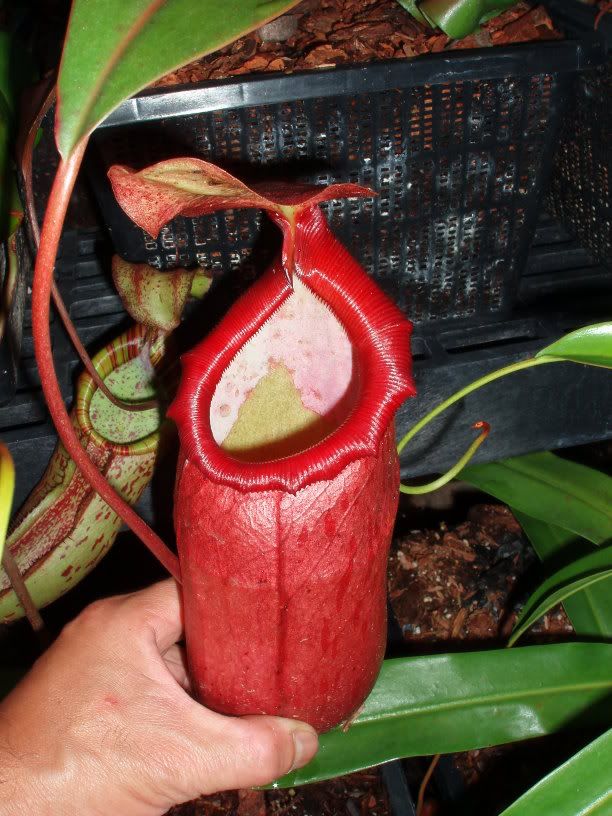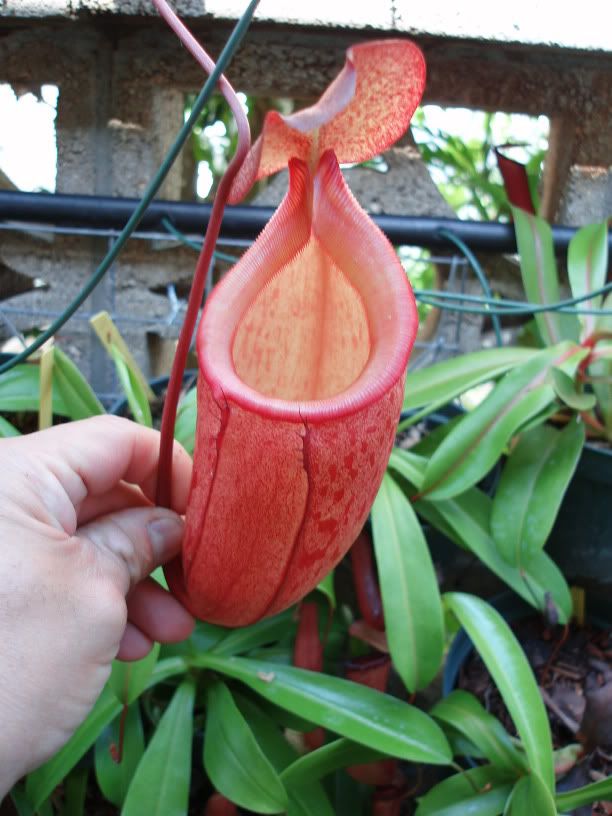
29th June 2008, 07:35 PM
|
 |
Administrator
|
|
Join Date: Tue Dec 2006
Location: Kuala Lumpur, Malaysia
Posts: 5,047
|
|
 rainforestguy: Sibuyanensis hybrids for the warm grower
rainforestguy: Sibuyanensis hybrids for the warm grower
rainforestguy
Senior Member
   
member is offline
 
Joined: Jul 2007
Posts: 386
 Sibuyanensis hybrids for the warm grower
« Thread Started on Nov 26, 2007, 11:51am » Sibuyanensis hybrids for the warm grower
« Thread Started on Nov 26, 2007, 11:51am »  I will post some sibuyanensis hybrids which have performed very well for me in my hot Hawai'ian climate. This is N. macfarlanei x sibuyanensis. I will post some sibuyanensis hybrids which have performed very well for me in my hot Hawai'ian climate. This is N. macfarlanei x sibuyanensis.
 This is growing the same as with everything else. Good light, good air circulation and I do fertilize. This is growing the same as with everything else. Good light, good air circulation and I do fertilize.
This is a favorite. N. thorelii x sibuyanensis

M
Link to Post - Back to Top  67.49.180.26http://www.lhnn.proboards107.com/index.cgi lamwn 67.49.180.26http://www.lhnn.proboards107.com/index.cgi lamwn
New Member

member is offline
 
Joined: Dec 2007
Posts: 7
Location: Singapore
 Re: Sibuyanensis hybrids for the warm grower
« Reply #1 on Dec 5, 2007, 9:32pm » Re: Sibuyanensis hybrids for the warm grower
« Reply #1 on Dec 5, 2007, 9:32pm »  Hi Rainforestguy, Hi Rainforestguy,
nice pics! does the thor x sib get larger than that pictured?
Not sure why many of my thorelli hybrids seem to be rather small-pitchered, though they make up for it with quantity and great colours.
thanks
Link to Post - Back to Top  218.186.9.4 sweethalo 218.186.9.4 sweethalo
Full Member
  
member is offline

 
Joined: Oct 2007
Gender: Female 
Posts: 119
Location: Singapore, Seletar
 Re: Sibuyanensis hybrids for the warm grower
« Reply #2 on Dec 6, 2007, 12:16am » Re: Sibuyanensis hybrids for the warm grower
« Reply #2 on Dec 6, 2007, 12:16am »  Hi Lam, Hi Lam,
Glad to see u here too!
Link to Post - Back to Top  202.156.14.10 rainforestguy 202.156.14.10 rainforestguy
Senior Member
   
member is offline
 
Joined: Jul 2007
Posts: 386
 Re: Sibuyanensis hybrids for the warm grower
« Reply #3 on Dec 7, 2007, 12:06pm » Re: Sibuyanensis hybrids for the warm grower
« Reply #3 on Dec 7, 2007, 12:06pm »  This forum is starting to feel like well worn shoe, feels great. Welcome Lamwn! The thorelii x sibuyanensis is smaller because this shot is the last colored pitcher before making uppers (by the way are smaller in comparison to the lowers). This plant also makes ground pups like N. thorelii, but are not as easy to remove. I assume the sibuyanensis influence has something to do with it. This forum is starting to feel like well worn shoe, feels great. Welcome Lamwn! The thorelii x sibuyanensis is smaller because this shot is the last colored pitcher before making uppers (by the way are smaller in comparison to the lowers). This plant also makes ground pups like N. thorelii, but are not as easy to remove. I assume the sibuyanensis influence has something to do with it.
I think if this is crossed back to thorelii, we would get a larger deeper colored thorelii! Interestingly the plant doesn't get so leggy as thorelii's do.
M
Link to Post - Back to Top  74.61.72.115http://www.lhnn.proboards107.com/index.cgi 74.61.72.115http://www.lhnn.proboards107.com/index.cgi

|